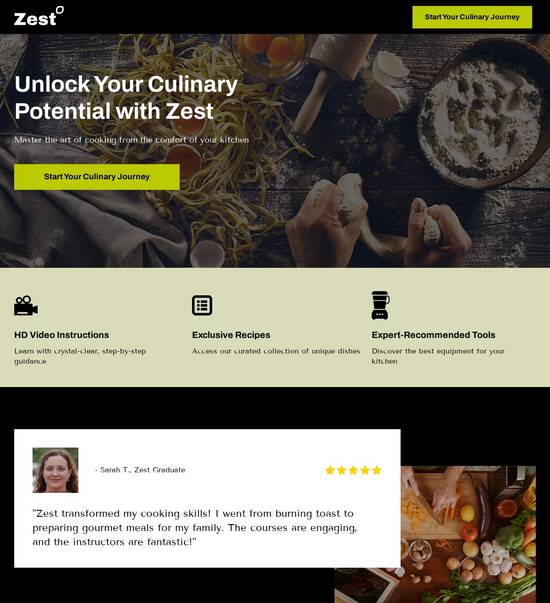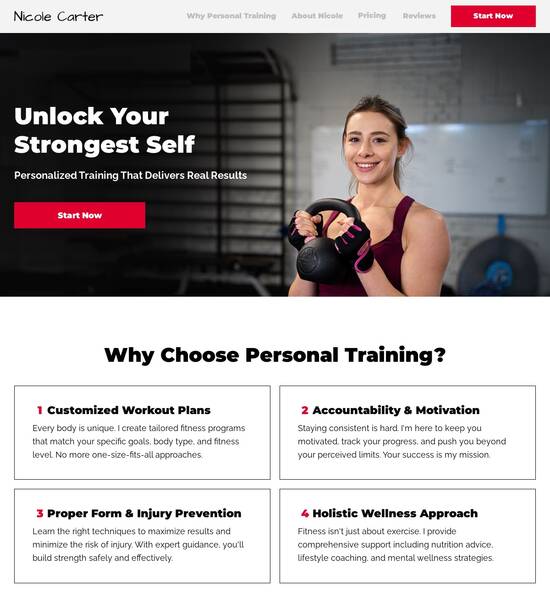
Web page template with interactive cookie consent pop-up
Explore Similar TemplatesAbout template
Use web page templates with interactive cookie consent pop-up and make your communications easy and transparent. Try our solution today.
Recommended templates

Easy to build without coding
With the intuitive drag-and-drop builder, anyone on your team can create high-converting pages without any knowledge of code or design. Make enhancements to your landing page with custom widgets using Javascript, HTML/CSS, or third-party scripts.

Multiple layouts for any industry and goal
Select from 500+ landing page layouts built to boost conversions across industry-specific scenarios. Customize them by adjusting fonts, adding images, and generating on-brand content with the AI assistant. Quickly scale with Instablocks® and Global Blocks that you can save, reuse, and update globally.

Loads fast and looks polished on any device
Every template is responsive, which means they present professionally on any device and load blazingly fast with our Thor Render Engine. You can also power them up with Google AMP technology to deliver an unparalleled mobile experience and drive higher conversions.

Robust analytics & experimentation
Get real-time updates and reporting across all your devices, showing the number of visitors, conversions, cost-per-visitor, and cost-per-lead. Launch AI-powered experiments, run A/B tests, and use heatmaps to analyze user behavior, then optimize your landing page to maximize conversions.







Easy to build without coding
With the intuitive drag-and-drop builder, anyone on your team can create high-converting pages without any knowledge of code or design. Make enhancements to your landing page with custom widgets using Javascript, HTML/CSS, or third-party scripts.
Multiple layouts for any industry and goal
Select from 500+ landing page layouts built to boost conversions across industry-specific scenarios. Customize them by adjusting fonts, adding images, and generating on-brand content with the AI assistant. Quickly scale with Instablocks® and Global Blocks that you can save, reuse, and update globally.
Loads fast and looks polished on any device
Every template is responsive, which means they present professionally on any device and load blazingly fast with our Thor Render Engine.
Robust analytics & experimentation
Get real-time updates and reporting across all your devices, showing the number of visitors, conversions, cost-per-visitor, and cost-per-lead. Launch AI-powered experiments, run A/B tests, and use heatmaps to analyze user behavior, then optimize your landing page to maximize conversions.
All the features you need to build cookie website template
Explore more featuresLearn how to build top-performing landing pages for any goal
FAQs
Leading the way in building high-performing landing pages





Mastering the art of web page template with interactive cookie consent pop-up
Implementing a web page template with an interactive cookie consent pop-up is crucial for any business looking to enhance user experience and ensure compliance with regulations. With Instapage's powerful landing page and CRO platform, marketers can effectively boost engagement and maximize the ROI of their digital initiatives.
Understanding cookie consent and its importance
A cookie consent pop-up informs users about the cookies being placed on their devices. This not only enhances transparency but also builds trust between users and brands. By adhering to laws like GDPR and CCPA, businesses can avoid hefty fines while providing users with a seamless browsing experience.
- Compliance with regulations: Ensuring your cookie consent pop-up meets legal standards protects your business from penalties.
- User trust: A transparent cookie policy fosters trust among users, potentially increasing their engagement with your site.
- Enhanced user experience: By providing clear options for cookie preferences, you show respect for users' choices.
Choosing the right web page template
Selecting a user-friendly and attractive web page template is integral to the effectiveness of your cookie consent pop-up. Instapage offers over 100 high-converting templates tailored for various industries.
- Responsive design: Ensure the template is mobile-friendly to reach users on all devices.
- Customization options: Select templates that allow easy customization to align with your brand identity.
- High conversion rates: Look for templates proven to convert effectively to maintain user engagement.
Configuring the interactive cookie consent pop-up
Once a template is selected, configuring the cookie consent pop-up requires attention to detail. This includes crafting clear messaging and choosing appropriate styling.
- Clear messaging: Use simple, concise language to explain the purpose of cookies to users.
- User-friendly options: Provide easy-to-understand options for users to accept or reject different types of cookies.
- Visual alignment: Ensure the pop-up visually complements your overall template design.
By following these steps, you'll create a compliant and engaging cookie consent experience for your web visitors.
Leveraging the right template and pop-up strategy can greatly enhance both user experience and compliance. Empower your marketing campaigns with Instapage's robust features.
Ready to get started with your web page template? Explore Instapage today and elevate your digital marketing efforts!
People also ask about Web page template with interactive cookie consent pop-up
Web page template with interactive cookie consent pop-up
Understanding cookie consent and its importance
Cookie consent is a fundamental component of data privacy regulations around the world. With the increasing emphasis on user data protection, understanding its necessity has become crucial for both users and businesses. By gaining consent from users regarding the use of cookies, companies not only comply with privacy regulations but also actively participate in protecting users' rights in the digital realm.
Major privacy regulations, such as the General Data Protection Regulation (GDPR) and the California Consumer Privacy Act (CCPA), impose legal requirements on organizations regarding user consent. Non-compliance with these regulations can lead to severe penalties, financial losses, and a damaging impact on brand reputation. Therefore, it is vital for businesses to establish transparent practices surrounding cookie usage from the outset.
Overview of privacy regulations emphasizes the need for explicit user consent regarding data collection.
Consequences of non-compliance can include fines, legal repercussions, and damaged customer trust.
Gaining consent builds trust and establishes a secure environment for website visitors, promoting ongoing relationships.
Beyond legalities, the landscape of user expectations is continuously evolving. Users are increasingly concerned about how their data is being utilized, and they expect transparency from the organizations they interact with. Cookie consent not only serves as a mechanism for compliance but also reinforces an organization’s commitment to ethical data handling practices.
Features of web page templates with interactive cookie consent pop-ups
Web page templates equipped with interactive cookie consent pop-ups are designed to enhance user engagement while ensuring compliance. These templates offer various customizable options to align with an organization's brand identity. Moreover, they frequently support cross-platform compatibility, ensuring the cookie consents function optimally on both mobile devices and desktops.
A variety of designs and color schemes is essential for establishing a visual connection with the audience. Templates should allow marketers to tailor the cookie consent design to match their branding while standing out enough to capture users' attention. Customizability is vital to ensure that the pop-up not only provides information but also resonates visually with visitors.
Customizable cookie consent templates allow for diverse design options that reflect the brand's image.
Cross-platform compatibility ensures seamless accessibility across various devices.
Integration with brand identity aids in creating a unified online experience for users.
Additionally, dynamic banners in these templates enhance user interaction. There are various types of banners, including those that appear at the top, bottom, or in the corner of the screen. Utilizing animations and transitions can markedly improve user engagement by making the consent process feel less obstructive and more interactive.
Design elements enhancing interaction and user experience
For a cookie consent pop-up to be effective, it needs to be visually appealing while also conveying a clear message. Imagery and icons that symbolize privacy and data protection can help communicate the essence of cookie consent to users. Moreover, careful selection of typography enhances readability, ensuring that users can quickly grasp the essential information.
Responsive design is crucial to cater to the varying screen sizes of devices. Elements within the pop-up must adjust accordingly, providing a seamless experience whether users access the website via smartphones, tablets, or desktops.
Visually appealing pop-ups employ imagery and icons that resonate with the cookie consent message.
Typography choices that enhance readability support better communication of policies and choices.
Responsive design ensures that all users have a consistent experience, regardless of device.
The design of buttons within the pop-up is also significant. Key buttons, such as 'Accept,' 'Decline,' and 'More Info', must be visually distinct and user-friendly to drive interaction. Visual cues, such as color contrast and placement, can further encourage users to engage with the options presented. Accessibility is another essential consideration, ensuring that all users, including those with disabilities, can interact with the pop-ups without challenges.
The approval process: ensuring user trust
Obtaining explicit consent from users is imperative for ensuring that businesses respect their privacy and data preferences. Techniques for garnering consent include clear and direct options to accept or decline cookies. Additionally, providing concise explanations of data handling practices can enhance users' understanding of how their data will be utilized, thereby establishing trust.
Allowing users to easily revoke their consent is equally critical. By offering straightforward mechanisms for users to change their preferences, businesses demonstrate their respect for user autonomy and foster a trustworthy environment. This transparency lays a strong foundation for building lasting relationships with website visitors.
Explicit consent is critical for compliance and fosters a sense of trust among users.
Clear explanations of data handling practices help users make informed decisions.
Facilitating easy consent revocation enhances user control and trust.
Educating visitors through user-friendly language about cookie use and data security can further solidify trust. Regular updates to consent practices, based on evolving regulations, also reassure users that the business prioritizes their privacy needs, ultimately leading to enhanced user loyalty.
Leveraging cookie consent for business optimization
Beyond compliance, cookie consent serves as an excellent opportunity for data analytics and gaining insights into visitor behavior. Understanding visitor demographics and preferences through consent analytics can lead to refined marketing strategies that better target the interests of specific audience segments.
Analyzing user behavior can provide businesses with invaluable data for optimizing marketing initiatives. By leveraging consent data to understand how users engage with a website, businesses can make informed decisions that align with user preferences, ultimately increasing conversion rates.
Consent analytics assists in tracking user behavior for improved marketing strategies.
Understanding visitor demographics aids in tailoring content and offers to meet their needs.
Data-driven insights enhance user retention and engagement by aligning with user preferences.
Moreover, interactive elements in cookie consent pop-ups can boost user retention. Engaging visitors through interactive consent experiences encourages repeat visits and builds loyal relationships. Regularly utilizing user feedback to assess the effectiveness of consent practices allows for continuous improvement and alignment with user expectations.
Innovative functionalities of cookie consent pop-ups
Innovative cookie consent pop-ups can offer multi-layered approaches to consent management, allowing for granular control over different types of data collection. Users appreciate being able to choose which cookies they allow, such as functional, analytical, or advertising cookies, thereby enhancing their sense of control.
Utilizing progressive disclosure methods, where additional information becomes available based on visitor interaction, improves user engagement and comprehension. Real-time updates on users' consent status and any changes in cookie policy not only keep users informed but also reinforce trust in the organization's approach.
Granular control enables users to select specific types of cookies they consent to.
Progressive disclosure presents information incrementally to enhance user understanding.
Real-time updates ensure users are informed about their consent status.
Furthermore, integrating cookie consent features with other business tools can optimize data utilization. Syncing consent data with email marketing platforms or Customer Relationship Management (CRM) strategies allows businesses to tailor their communications based on users' preferences while maintaining compliance.
The future of cookie consent and user engagement
As privacy regulations evolve, so does the approach businesses must take regarding cookie consent. Anticipating changes to legal standards and user expectations is essential in maintaining compliance and promoting user trust. Organizations need to implement adaptive technology solutions that allow for quick adjustments to consent practices as regulations change.
The integration of AI and machine learning in consent management will further enhance user experience. By personalizing consent experiences based on different user segments, organizations can offer tailored experiences that resonate more effectively with diverse audiences. Predictive analytics can provide insights into understanding user behavior, ultimately refining consent strategies.
Anticipating privacy regulation changes is crucial for maintaining compliance.
AI empowers personalized consent experiences better suited to user segments.
Predictive analytics help businesses understand user preferences for improved strategies.
Automation of consent updates ensures that businesses remain compliant while minimizing manual effort. This level of efficiency will allow organizations to focus more on their core activities while still aligning with privacy regulations and enhancing user trust in their commitment to data protection.
Case studies: success stories of businesses using interactive cookie consent
Numerous businesses have successfully implemented interactive cookie consent pop-ups, reaping the benefits of increased trust and improved user engagement. One notable example is an e-commerce website that integrated a visually captivating cookie consent template. This implementation increased user assurance, leading to higher conversion rates as customers felt confident in the site's commitment to data privacy.
Another case study involves a service industry company that maintained transparency by effectively communicating its data handling practices via its cookie consent pop-up. This approach kept users informed, satisfied, and regularly engaged with the brand, enhancing overall customer loyalty. Clearly, businesses that prioritize effective cookie consent practices stand to gain in both reputation and retention.
E-commerce site increased trust and sales through captivating cookie consent.
Service industry maintained user satisfaction through transparent cookie management.
From these case studies, businesses can learn that optimization of consent management requires attention to both design and communication strategies. Regular evaluations of key metrics will also help gauge the effectiveness of cookie consent practices and ensure compliance with evolving regulations.
Crafting your own cookie consent strategy
Creating an effective cookie consent strategy begins with choosing the right web page template. The template must not only align with existing website design but also cater to the varying preferences of visitors. It's essential to explore options that provide adequate customization to fit the unique identity and messaging of your brand.
Ongoing efforts to enhance user consent engagement should encompass regular assessments based on visitor feedback. Businesses should be open to A/B testing different template designs and functionalities to see which version leads to higher interaction rates. By gathering insight from users regarding their preferences and concerns, businesses can adapt their strategies to best meet compliance requirements and user needs.
Selecting a compatible web page template supports an integrated user experience.
Regular assessment of user feedback enhances engagement with cookie consent.
A/B testing different designs allows businesses to discover what works best for their audience.
In conclusion, an effective web page template with an interactive cookie consent pop-up not only meets compliance needs but also builds trust among users. By focusing on transparency and user preferences, businesses can foster long-lasting relationships, enhance user satisfaction, and ensure smooth navigability across digital platforms.
Ready to skyrocket conversions?
Supercharge your ad campaigns with high-performing landing pages
Get started














